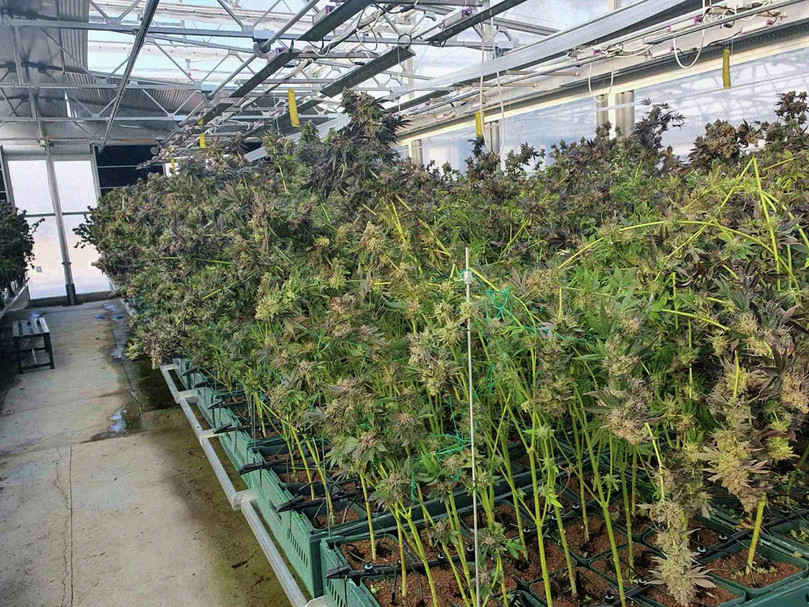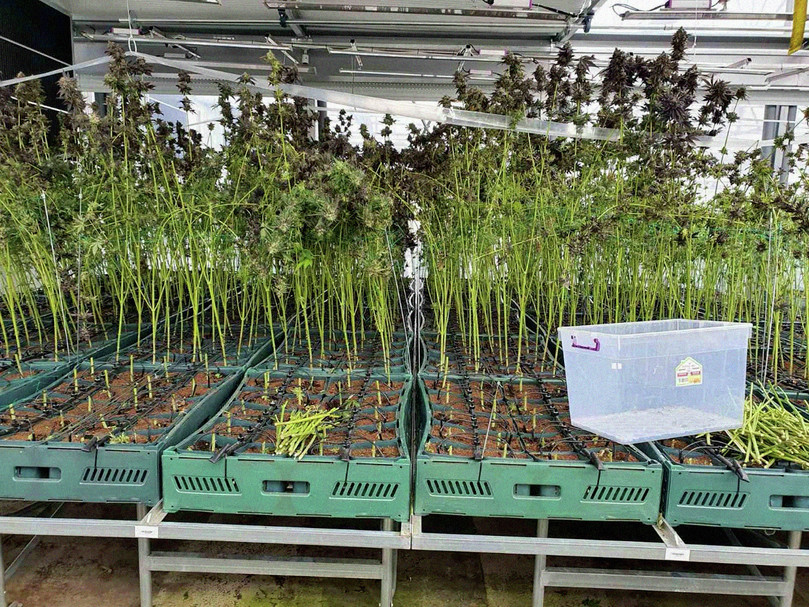The legalized medical cannabis business in North Macedonia is at risk of criminal diversion.
North Macedonia legalized the cultivation of medical cannabis in 2016. Since then, the industry has boomed. As of March 2024, there were nearly 70 privately owned companies in North Macedonia registered for the cultivation of cannabis for medical use and the production of both cannabis buds and oil.1 But Macedonia’s cannabis business is vulnerable to corruption surrounding the issuing of licences and in the form of diversion of legally grown cannabis onto the black market.
While there is a steady yet limited demand for medicinal cannabis products in the Western Balkans, there is a significant illegal market for dry cannabis buds in the region. Indeed, cannabis is the most consumed drug in the Western Balkans.2 North Macedonia is also a major transit hub for the trafficking of cannabis produced in Albania.3
There is concern that some of the market for illegal cannabis is being supplied from companies with licences to grow cannabis legally for medical use. Under the current Law on Control of Narcotic Drugs and Psychotropic Substances, cannabis grown in North Macedonia that is not used for medical purposes cannot be exported.4 Yet it seems that in many cases more cannabis is grown by licensed companies than is needed for legal export. An over-supply of a legally grown product for which there is a large black market creates obvious risks.
In the past few years, police in North Macedonia have taken actions against licensed companies for various transgressions, including the diversion of their produce for smuggling. In some cases, the actions have been taken to enforce the law against companies that have failed to meet required standards. This may either be the fault of the company or the result of lax regulation by the relevant bodies,5 namely the ministries of agriculture and health,6 along with a five-member special commission that is expected to track production and conduct inspections of each plantation at least twice a year.7 In other cases, the police have acted on suspicions that cannabis grown at licensed facilities was being wittingly or unwittingly diverted onto the black market.
In a recent high-profile example, a police operation in North Macedonia in March 2024 targeted dozens of suspected criminals allegedly involved in the illegal production and distribution of drugs. Among those arrested was Boro Stojchev, also known as ‘Boro Marlboro’, a former mayor of Novo Selo.8 Stojchev’s alleged involvement in cannabis smuggling drew public attention, not least since his son’s company obtained a cannabis cultivation licence in 2020. Police raids as part of this operation in locations including Strumica, Gevgelija, Demir Kapija, Struga and Prilep seized over 100 kilograms of marijuana, leading to charges related to the unauthorized sale and distribution of the drug.9 Stojchev pleaded guilty and was sentenced to five years and three months in prison.10


The cultivation of cannabis for medical use is booming in North Macedonia, but there is a risk that excess supply is being diverted to the black market.
Photos supplied
Other raids and seizures have taken place based on business irregularities. In February 2022, for example, police raided a company legally growing cannabis for medical purposes in the town of Strumica and seized around 1.5 tonnes of cannabis due to ‘irregularities’ in the firm’s operation. No arrests were ever made.11
In the European summer of 2022, within a span of 48 hours, North Macedonian police conducted raids on two cannabis plantations near Lake Ohrid.12 These plantations were licensed for medical cannabis cultivation, but police raids uncovered regulation violations that, according to an investigation by the Balkan Investigative Reporting Network, indicate that some of the legally grown cannabis may have been entering the illegal market.13
In April 2023, police intercepted 100 kilograms of premium-grade cannabis that, according to the interior ministry, is likely to have originated from a legitimate factory producing cannabis oil for medical use.14 Authorities estimated the street value of this haul, which they suspected was destined for the black market, at up to €600 000.15 The contraband was discovered in and seized from a car with Skopje licence plates; the vehicle was stopped in Negotino and the driver allegedly attempted to flee before he was apprehended.16
On 6 July 2023, in the village of Sopot close to the town of Kavadarci, authorities confiscated 225 kilograms of cannabis and 1 000 cannabis buds worth half a million euros from a medical cannabis-producing company.17 Police reports cite suspicion of illegal activity centring on alleged attempts by company personnel to distribute drugs on the black market.18
In September 2023, authorities revoked the permits of three medical cannabis companies after a police inspection of a licensed cannabis cultivation facility in the village of Vrapchiste uncovered numerous irregularities.19 Security and surveillance cameras were absent, the perimeter fence was damaged, and the premises lacked electricity. Instead of registered employees, two unauthorized Albanian citizens were found. Inside the secure storage area, police seized 327.3 kilograms of dried cannabis flowers, packed in aluminium bags, which exceeded the legal limits. Additionally, 23.3 kilograms of excess cannabis were noted.
Also in Vrapchishte, on 15 December 2023, police seized 4 341 tonnes of cannabis, valued at over €10 million, from a legal entity. This seizure followed a government decision to revoke the licence of the company due to several irregularities uncovered during an inspection of the size of the area under cultivation, equipment and staff.20
In 2023, the police revoked eight licences of companies producing medical cannabis, according to data from the interior ministry.21 That year, 4.6 tonnes of cannabis were seized alongside 3 799 cannabis sativa plants.22 In 2022, the police revoked seven licences for companies operating in the industry, and in police operations actions against legal companies, 561.1 kilograms of cannabis were alongside 8 723 cannabis sativa stems.23
Figure 1 Revoked licences and confiscated items, 2021–2023.
Issuing of licences vulnerable to corruption
Another weak link is the issuing of licences. While cultivation of medical cannabis was legalized in 2016 through amendments to the Law on Control of Narcotic Drugs and Psychotropic Substances,24 it was only after former prime minister Zoran Zaev came to power in 2017 that the industry began to boom. He predicted that it would bring in revenues of €250 million and help boost employment.25
The cannabis business has indeed been a cash cow for private companies and the state. Data from the Public Revenue Administration shows that in 2022 and 2023 companies in North Macedonia engaged in the cultivation of aromatic and medicinal plants and plants (for use in pharmacy) paid approximately €5 million in value added tax.26 It is predicted that the market will continue to expand at an annual rate of 4.76% from 2024 to 2029, resulting in a sales volume of US$37.90 million in five years.27
| Year | VAT tax paid | Profit tax paid |
|---|---|---|
| 2022 | 129.3 million denars (€2.1 million) | 3.4 million denars (€53 800) |
| 2023 | 181.3 million denars (€2.9 million) | 33.9 million denars (€542 100) |
| Total | 310.6 million denars (€5 million) | 37.3 million denars (€595 900) |
Figure 2 Taxes paid by medical cannabis companies in North Macedonia, 2022–2023.
Data collected from the Public Revenue Administration, 20 February 2024.
At the same time, it appears that the granting of licences has also been a lucrative business, with state officials sometimes implicated.28 According to a high-ranking police officer in Skopje, political connections are often required to obtain a licence and that this can be facilitated by bribes or political donations.29
Implications for North Macedonia and beyond
North Macedonia’s decision to legalize the cultivation of medical cannabis has brought lucrative rewards to the government and those involved in the business, but also risks, especially in terms of corruption surrounding the process of granting licences and the diversion of cannabis onto the black market, whether by insiders or third-party theft.
North Macedonia’s experience highlights a central challenge of drug control at a time of growing liberalization of laws and attitudes towards cannabis use: how to regulate the difference between licit and illicit markets; and how to enforce the law when different countries have different laws, even within the same region, especially the size of the Albanian black market.
The country’s situation also highlights a paradox in which some ministries profit from cannabis cultivation while the police spend time and resources on dealing with repercussions generated by the same business. This is a challenge that will be faced by North Macedonia’s new government, following an election in May won by the centre-right, but the problem is not unique to this Balkan country.
Notes
-
Who controls the cannabis factories?, Vecer, 4 March 2024. ↩
-
Observatory of Illicit Economies in South Eastern Europe, Lessons learned from cannabis legalization in North Macedonia, Risk Bulletin, Issue 5, Global Initiative Against Transnational Organized Crime, March 2021. ↩
-
Ibid. ↩
-
Marija Mitevska, How did legal marijuana end up in the hands of criminals?, Radio Free Europe/Radio Liberty (RFE/RL), 23 December 2020. ↩
-
Interview with a North Macedonian underground figure, Skopje, 2 May 2024. ↩
-
North Macedonia Ministry of Health, Law on Control of Narcotic Drugs and Psychotropic Substances, Official Gazette of Macedonia, No 37/2016, Article 29-c. ↩
-
According to Article 29-b, paragraph 5, the commission is formed by the health minister. It is composed of two representatives from the Ministry of Health, one representative from the Ministry of Agriculture, one representative from the Agency for Medicines and Medicinal Products, and one specialist in the field of medicinal plants. ↩
-
Prosecutor’s office: Detention for all those arrested in the ‘Chibuk’ action, two were already in prison, Faktor, 3 March 2024. ↩
-
Ibid. ↩
-
Srdjan Stojanchev, Боро Марлборо веќе осуден, а им скрои капа на врховен судија и член на Советот на јавни обвинители, Telma, 21 May 2024. ↩
-
N. Macedonia medical marijuana firm raided, 1.5 tons seized, Associated Press, 9 February 2022. ↩
-
Vlado Apostolov, Jelena Veljkovic and Besar Likmeta, Crime ties exposed in North Macedonia medicinal cannabis boom, Balkan Insight, 28 March, 2023. ↩
-
Ibid. ↩
-
The Ministry of the Interior seized legal marijuana destined for the black market, RFE/RL, 6 April 2023. ↩
-
Ibid. ↩
-
Ibid. ↩
-
The Ministry of the Interior seized 225 kilograms of drugs worth half a million euros, A1on, 6 July 2023. ↩
-
Ibid. ↩
-
Miroslava Simonovska, Companies for medical cannabis were left without permits, Sloboden Pečat, September 2023. ↩
-
Ivan Kolekevski, Police seize over 4.3 tons of marijuana in Gostivar region, MIA, 15 December 2023. ↩
-
Ministry of Internal Affairs, Annual report 2023, 20 March 2024. ↩
-
Ibid. ↩
-
Ministry of Internal Affairs, Annual report 2022, 17 March 2023. ↩
-
David Segal, North Macedonia waits for a green light, and a lucrative high, The New York Times, 9 September 2021. ↩
-
Vlado Apostolov, Jelena Veljkovic and Besar Likmeta, Crime ties exposed in North Macedonia medicinal cannabis boom, 28 March, 2023. ↩
-
Data collected from Public Revenue Administration, 20 February 2024. ↩
-
Ibid. ↩
-
The legalization of cannabis production for medicinal purposes is being abused, Nova Makedonija, 4 March 2024. ↩
-
Interview with a former high-ranking police officer, Skopje, 4 June 2024. ↩
